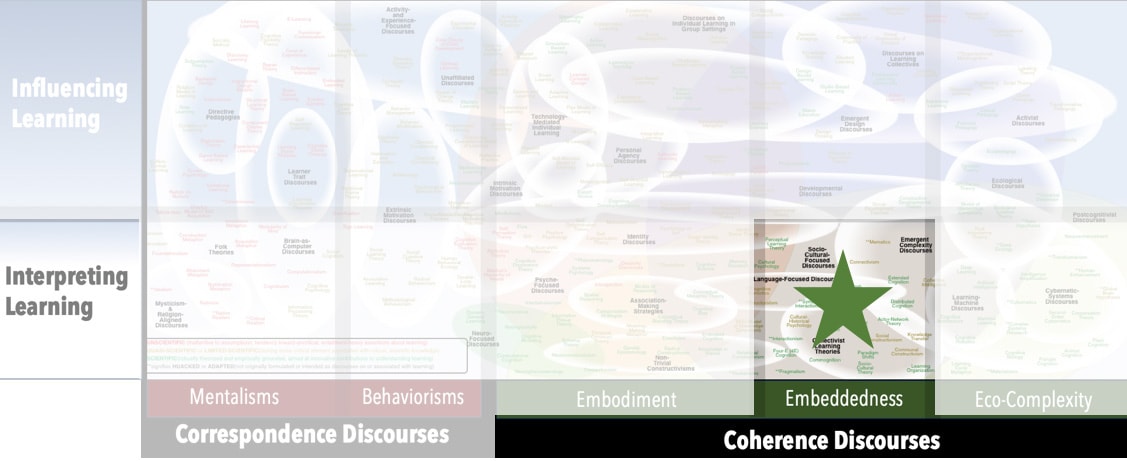Focus
Emergence and self-maintenance of social networksPrincipal Metaphors
- Knowledge is … constantly rehearsed relationships (among elements in a network)
- Knowing is … rehearsing relationships (among elements in a network)
- Learner is … networked assemblages / material and semiotic networks among humans
- Learning is … adapting (i.e., changes in a network to maintain its viability)
- Teaching is … N/A
Originated
1980sSynopsis
Actor–Network Theory (ANT) is founded on the assertion that everything exists in dynamic networks of relationship. Aiming to describe how networks are assembled and maintained, ANT’s focus is on relationship – that is, not on individual entities (actors) but on the assemblages comprising interrelationships of humans and nonhumans (actor–networks). Human and nonhuman elements of social situations – the nodes of the network – are seen to be on the same level. That is, objects, processes, thoughts, persons, and so on are seen as equally important. Agency and power are located in the material (physical) and semiotic (conceptual) associations among humans and nonhumans (i.e., the network’s links).- Actor (Actant) – any form or entity that can act and/or trigger action
- Actor Network – the “shape” of the associations among Actors. It is generally granted in Actor–Network Theory that such a network is about roles and relationships, and so it arises and persists in co-activity. That is, it is continuously performed, it is always in process, and it is perpetually in threat of breaking down.
- Punctualization – the possibility of treating an Actor Network as a single node within a grander Actor Network. (See also: Scale Invariance and Scale-Free Network, under Complex Systems Research.)
- Quasi-Object (Token) – an idea or entity that passes among the Actors in and Actor Network, in the process enabling the connectivity of that network
- Translation (Sociology of Translation) (Michel Callon, 1980s) – within Actor–Network Theory, the processes associated with building and maintaining an Actor Network
Commentary
Originating in Sociology in the 1980s, ANT is now a prominent theory in political science, health professions, business, and education. Consequently, ANT has evolved considerably since it was first introduced, to the point it cannot be considered a single or a coherent theory. In another vein, proponents of ANT draw a sharp distinction between description and explanation, asserting that ANT as concerned with the former. While many see this focus as a strength, some have argued that a theory that doesn’t provide explanations is of limited value.Authors and/or Prominent Influences
Bruno Latour; Michel CallonStatus as a Theory of Learning
Few proponents of ANT would regard it as a theory of learning. However, if the “learner” is taken to be a constantly shifting network of relationship, ANT might be seen as an innovative and disruptive theory of learning.Status as a Theory of Teaching
Because it is focused on description rather than explanation, ANT is more focused on understanding the structures and dynamics of networks than on influencing or transforming them. As such, ANT should not in any way be construed as a theory of teaching. That said, ANT can operate in studies of formal education to inform, for example, policy, curriculum, modes of information exchange, power structures, and so on.Status as a Scientific Theory
ANT is unwaveringly scientific. It is associated with extensive research across multiple disciplines.Subdiscourses:
- Actor (Actant)
- Actor Network
- Punctualization
- Quasi-Object (Token)
- Translation (Sociology of Translation)
Map Location

Please cite this article as:
Davis, B., & Francis, K. (2023). “Actor–Network Theory” in Discourses on Learning in Education. https://learningdiscourses.com.
⇦ Back to Map
⇦ Back to List
